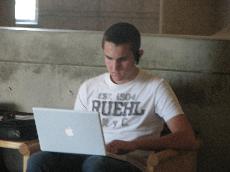Students enjoy new high-tech tools: an expanded wireless network and the newly acquired 24/7, online, chat-based, library assistance program called “Ask Us Now.”
The Wi-Fi network, originally implemented on the first and fourth floors, now includes all four floors of the LRC. Up and down the building students with laptops are plugged in to the internet – for free! Whether doing research for papers, checking the local news, or just watching funny YouTube videos, these students are stepping into the future. “These are the preliminary steps,” says LRC Chair, Jack Forman, “to making the whole campus accessible by Wi-Fi.”
SDCCD students can retrieve access codes online, with just a CSID number, at http://www.sdmesa.edu/library/index.cfm, the Mesa Library’s Web site, or at the reference desk located on the first floor. Crosschecking of current enrollment status and CSID numbers, including those from Miramar and City Colleges, ensures that only students can access the network – protecting bandwidth from wireless neighbors.
Users enjoy unrestricted access to any and all online material. Bandwidth and content remain entirely uncontrolled, despite the occasional digital traffic jams caused by social networks like MySpace and Facebook.
College officials refrain from monitoring and searching personal devices logged on to the network. “Our job is not to watch what people do,” assures Mr. Forman, “but, to make the technology available.” Enjoying the Wi-Fi with the freedom and privacy of a personal laptop outside the LRC café, Mesa student “Rodie” exclaims, “It rocks!”
The “Ask Us Now” service is another high-tech service offered to today’s Mesa College student. “It’s a dialogue. It’s an active chat,” explains Forman. Students can ask librarians from all over the world any question related to regular library services at any time of day, any day of the week.
Professional librarians, including our own Allison Steinberg, offer a co-browsing service that allows them to research with you. Live chat offers an interface that is both immediate and personal. Students and librarians alike can send each other links to different sites and discuss, in real time, the relevance of the information and the reliability of the source.
Subjects can range from who the author of a specific book or quote is, where to find databases of academic journals, and even where a room in your own library is.
Nine libraries in San Diego and Imperial Counties have joined the “Ask Us Now” program. One or two librarians from each library answer questions from students the world over for two hours a week.
From solitary, coffee wielding researchers on the third floor to the boisterous groups crowding single laptop screens in the Café Commons, Mesa students are taking advantage of the LRC’s high-tech services. These are “a necessary feature to campuses now,” explains Forman, “students carry their laptops like they carry their cells or their wallets.”

